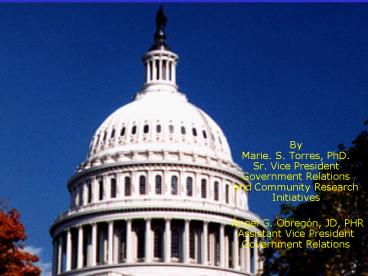Advocacy 101 - PowerPoint PPT Presentation
1 / 19
Title: Advocacy 101
1
Advocacy 101
- By
Marie. S. Torres, PhD.
Sr. Vice President Government
Relations
and Community Research Initiatives - Ángel G. Obregón, JD, PHR
Assistant Vice President Government Relations
2
Overview
- What is nonprofit advocacy?
- What is public policy?
- What do you want?
- Who do you contact?
- Who do you speak with?
- Advocacy Actions
3
What is "nonprofit advocacy"?
- (Type Your Organization) engages in advocacy
whenever we work to change public policy. - Advocacy activities such as lobbying, community
organizing, working with the media, educating
voters, researching and reporting on problems
facing communities, conducting voter registration
and get-out-the-vote campaigns, protesting in the
streets, and other actions.
4
What is public policy advocacy?
- (Type Your Organization) has a unique and
essential role to play in the policy process. - As a nonprofit, (Type Your Organization)
traditionally serves constituencies, (our
patients, participants and clients) and others on
issues that may have a limited voice in the
policy process. - (Type Your Organization), as a nonprofit
organization, provides information on health and
social needs that exist and need to be to
addressed by legislators.
5
What is public policy advocacy?
- (Type Your Organizations) advocacy efforts are
driven by our mission statement and core values,
which is a commitment to a broad community of
people or common interests. - This essential representative role, unique
knowledge, and clear vision are the reasons that
policymakers look to (Type Your Organization) for
leadership.
6
What Do You Want?
- Before deciding to call, write, or visit your
member of the City Council, Board of Supervisors,
California Legislature or United States Congress
to share your views on policy issues you care
about, you should know what you want from your
elected representatives. - Your goal is to force someone in the legislative
office to think about you and your issues for
longer than 5 minutes -- making the "ask" helps
you achieve that goal.
7
Whom Do You Contact?
- Federal Issue - Immigration, Social Security,
Medicare and Medicaid - U.S. Senators
- U.S. Congress Member
- State Issue - Education, Medi-Cal, Housing
Transportation - State Senator _____, or
- State Assembly Member
- Local Issue - Street repair, lighting, noise
abatement, housing ordinance, transportation - County Supervisor _______
- Mayor ________
- Council Member ________
8
With Whom Do You Speak?
- The District/State Scheduler schedules the
members time when he or she is in the district
or state. - The Field Representative handles local policy
issues and is the principal liaison between the
elected officials and local businesses,
organizations, and citizens. - The District/State Office Director oversees the
operations of the district or state staff and is
often the point person in the district office for
highly sensitive local political issues.
9
With Whom Do You Speak?
- The Legislative Director (LD) handles policy
issues and oversees the legislative staff. - The Chief of Staff (CoS) The chief of staff may
sometimes handle a few policy issues, but
generally his or her time is spent managing the
office - County/City Council Deputies often are assigned
to handles health, senior and transportation
issues.
10
Figuring Out What You Want
- To make sure you're asking for something that
makes sense, you need to gain a working
understanding of what a legislative office can
and cannot do for you, as well as an
understanding of the policies that interest you.
11
Advocacy Actions
- Recommending legislation
- Letter writing
- Face-to-face meetings
- Testimony
- Follow up
12
Advocacy Actions
- You may ask your legislator to introduce
legislation to change an existing and/or create a
new one. - You may ask your legislator to cosponsor existing
legislation introduced by another legislator.
13
Legislation
- You may ask your legislator to vote for or
against legislation being considered by the
committee he or she serves on. - You may ask your legislator to ask another
legislator to support a proposal that is under
review by another committee.
14
Letter Writing
- Send a letter to a state or federal agency about
a concern you may have with a particular agency
action. - Send a letter in support of a a state or federal
grant application you have made. - Send a letter to an influential member of the
Legislature or Congress, such as a Committee
chair or a member of the leadership, about a
particular issue you may care about.
15
Face To Face Meeting
- Call your Representative's District office and
ask to speak with a staff member who is
responsible for the issue you are concerned
about. - Request a meeting between you and the staff
member or legislator to discuss your concerns and
recommended actions.
16
Testimony
- Prepare remarks based upon your experience which
are relevant to the issue or proposal. - Your testimony can be given in person during a
formal hearing, or only in writing, or both to
all members of the legislative committee.
17
Follow Up Action
- Place a phone call, email, fax to the City
Council Office, Supervisor Office, District
Office, and/or to the Capitol Office in
Sacramento or Washington, D.C. - If your issue has successfully passed out of the
Legislature, then you must follow up using the
same advocacy actions with the Office of the
Governor or President of the United States. A
County or City Council ordinance is enacted
unless the jurisdiction has an elected Mayor.
18
Valuable Links
- Other Resources
- Find my State Assembly Representative
- Find my Congress Representative
- Links
- www.ccoa.gov
- www.4csl.org
- www.c4a.info
- www.senate.ca.us.gov
- www.assembly.ca.us.gov
- Links
- www.house.gov
- www.senate.gov
- www.whitehouse.gov
- http//bos.co.la.ca.us
- http//thomas/loc.gov/
- www.hhs.gov
- www.cdc.gov
- www.governor.ca.gov
- www.dof.ca.gov
- www.dhs.ca.gov
19
The End
- The End































